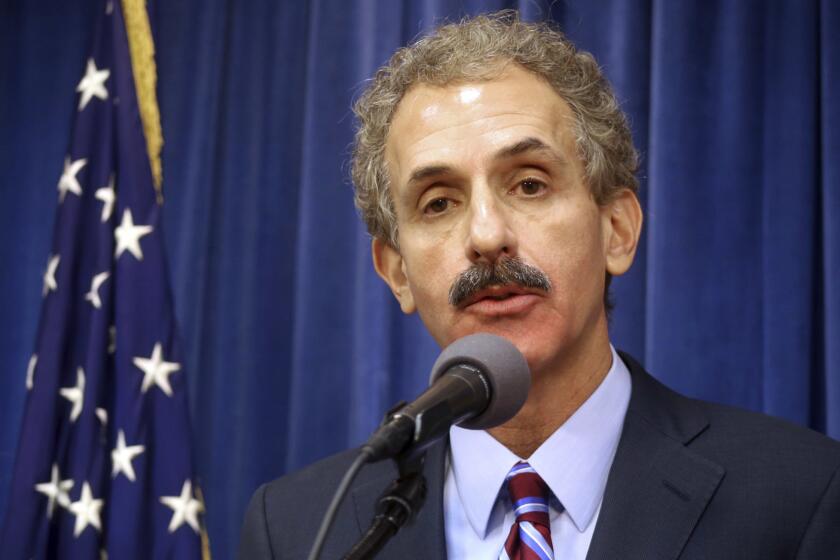Shipment of illicit COVID-19 tests seized off flight at San Diego airport
- Share via
The shipment that arrived at the San Diego International Airport from Mexico was labeled as “plastic card.” Instead, the the two parcels held 251 illicit COVID-19 testing kits, authorities said this week.
The Dec. 1 seizure at the Port of San Diego is part of a larger trend seen at border crossings and commercial ports, as the black market rises to profit off the demand for testing.
Shipments of tests that are fake, mislabeled or not approved by the Food and Drug Administration have been seen since the early days of the pandemic, with port seizures reported in Rochester, N.Y., Chicago, Indianapolis and elsewhere.
At the Los Angeles Port of Entry in March, a parcel at the international airport’s mail facility was labeled “Purified Water Vials,” according to Customs and Border Protection. After further inspection, officers found vials filled with a white liquid and labeled “Corona Virus 2019nconv (COVID-19)” and “Virus1 Test Kit,” CBP said. The shipment had come from the United Kingdom.
At the Port of Baltimore, a shipment of tests was hidden under tea from China.
A Huntington Beach company falsely promised buyers an FDA-approved coronavirus home testing kit with results in 10 minutes, L.A. city attorney says.
Federal authorities have also seen tests moving into Mexico. In May, a Mexican man crossing south at the Santa Teresa Port of Entry was found to be carrying 1,000 counterfeit tests in a suitcase, according to Border Patrol officials.
“Some appear to be exploiting the pandemic for financial gain, leaving the consumer at risk. These products may result in serious consequences to the consumer, whether that end user is in the United States or another country,” CBP El Paso Director of Field Operations Hector Mancha said at the time.
The FDA issued a warning about scams surrounding the pandemic in general, saying many do-it-yourself tests, which may not actually work, are for sale online. Police in New London, Conn., seized counterfeit tests being sold in a 7-Eleven.
“Currently, the only way to be tested for COVID-19 is to talk to your healthcare provider,” the FDA warning states. “At this time, the FDA has authorized one COVID-19 self-test to be completely used and processed at home. You will risk unknowingly spreading COVID-19 or not getting treated appropriately if you use an unauthorized test.”
Fake testing sites have also popped up around the country, according to the Federal Trade Commission, and the repercussions can be more than just health-related. At one such operation in a drive-up site in Louisville, Ky., residents paid scammers more than $200 per test, according to local news reports.
“The fake sites can look real, with legitimate-looking signs, tents, hazmat suits and realistic-looking tests. And the damage these fake testing sites can cause is very real,” the FDA warned.
Local and federal authorities say many frauds have emerged amid the coronavirus pandemic, feeding off the fear and confusion bred by the virus and its lack of a cure or vaccine.
“They aren’t following sanitation protocols, so they can spread the virus. They’re taking people’s personal information, including Social Security numbers, credit card information and other health information — all of which can be used for identity theft and to run up your credit card bill.”
Another widely reported scheme involves fraudsters offering at-home testing kits to Medicare beneficiaries via phone or in-person. The end result is stolen personal information and tests that are unreliable.
Immigration and Customs Enforcement began targeting illicit tests and related items with Operation Stolen Promise in April and, as of Nov. 25, have seized more than 1,600 shipments with help from CBP, the agency said.
In the most recent case, CBP officers assigned to the San Diego airport inspected two parcels that had arrived on a flight from Mexico. The FDA determined the kits were misbranded and not authorized for emergency use in the U.S. The kits were valued at $5,000.
Agents with ICE’s Homeland Security Investigations will look into the case further.
Davis writes for the San Diego Union-Tribune.
More to Read
Sign up for Essential California
The most important California stories and recommendations in your inbox every morning.
You may occasionally receive promotional content from the Los Angeles Times.












